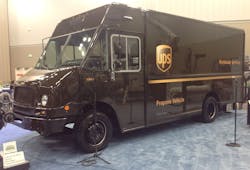Big Brown to pour green into propane
INDIANAPOLIS. UPS announced it will invest some $70 million to deploy propane-autogas (LPG) power in its fleet of distinctive “package car” medium-duty delivery vans at a news conference here at the NTEA Work Truck Show.
The package-delivery giant said its investment plan calls for the purchase of 1,000 propane-fueled trucks as well as installing an initial 50 LPG fueling stations at UPS locations in the U.S.
“A year ago, we got together with [truck builder] Freightliner Custom Chassis Corp. (FCCC) along with the Propane Education & Research Council (PERC) Propane Education & Research Council (PERC) on this project,” said Michael G. Britt, Sr., UPS’ director of Maintenance & Engineering International Operations.
He related that the new propane trucks will replace older gasoline- and diesel-powered ones used largely in rural parts of Louisiana and Oklahoma, with use in other states pending. Trucks on the affected routes can run up to 200 miles on a single tank of propane, according to UPS.
The LPG-fueled trucks will begin operating by the middle of this year with their rollout slated to be completed by early next year.
Britt advised that before deciding to move forward on the project, UPS tested 20 propane-powered “successfully” this past winter in Gainesville, GA, leading it to “expand its order” for step vans with FCCC.
The propane-fueled package cars are expected to travel more than 25 million miles and to displace some 3.5-million gallons of conventional gasoline and diesel each year.
The FCCC step vans that will be delivered tor UPS will be powered by a GM 6.0L V8 LC8 engine that is part of an LPG powertrain package engineered by Powertrain Integration (PI).
The PI powertrain also includes a liquid-propane-injection (LPI) fuel system provided by CleanFuel USA as well as an Allison automatic transmission.
According to UPS, its LPG deployment this year “benefits from propane autogas’ wide availability as a result of increased natural gas production in the U.S., and there is more price stability with the accessible supply.” The carrier noted that it currently operates nearly 900 propane vehicles in Canada.
“The opportunity to road-test new propane vehicles and fueling equipment with one of the most sophisticated fleets in the country is a major milestone for the propane industry,” noted Roy Willis, president & CEO of PERC. “This announcement is the culmination of many entities bringing together the best in propane technology to achieve the greatest economic and environmental results.”
“The UPS alternative fuel strategy is to invest in the most environmentally friendly and economical energy sources,” said David Abney, UPS chief operating officer. “Propane meets those criteria as a clean-burning fuel that lowers operating costs and is readily accessible, especially on rural routes in the U.S.
“States that attract this type of investment with tax incentives and grants will factor into the UPS deployment strategy,” he added.
UPS noted that in collaboration with PERC— which it described as a “non-profit propane technology incubator”—it worked with equipment manufacturers to secure certifications for the propane trucks with both the U.S. Environmental Protection Agency and the California Air Resources Board.
Per UPS, it runs one of the largest private alternative-fuel fleets in the U.S. with more than 3,150 alternative fuel and advanced technology vehicles. These include all-electric, hybrid electric, hydraulic hybrid, CNG, LNG, propane, biomethane, and light-weight fuel-saving composite body vehicles.
